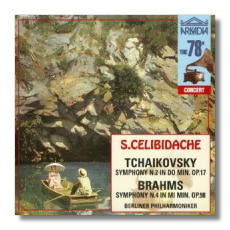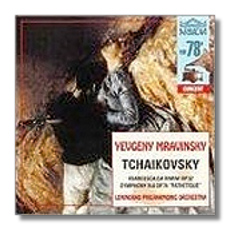
The Internet's Premier Classical Music Source
Related Links
-
Brahms Reviews
Tchaikovsky Reviews - Latest Reviews
- More Reviews
-
By Composer
-
Collections
DVD & Blu-ray
Books
Concert Reviews
Articles/Interviews
Software
Audio
Search Amazon
Recommended Links
Site News
 CD Review
CD Review
Tchaikovsky & Brahms

Symphonies
- Piotr Ilyitch Tchaikovsky: Symphony #2 "Little Russian" in D minor
- Johannes Brahms: Symphony #4 in E minor
Berlin Philharmonic Orchestra/Sergiu Celibidache
Arkadia CD78580 ADD monaural 75:04


Piotr Ilyitch Tchaikovsky
- Symphony #6 in B minor "Pathétique"
- Francesca da Rimini
Leningrad Philharmonic Orchestra/Yevgeny Mravinsky
Arkadia CD78581 ADD monaural 67:39
Arkadia, an Italian label, specializes in recordings from the 78-rpm era. It features a large selection of operas originally released on Cetra (for example, the famous Puccini Turandot with Gina Cigna and Magda Olivero), plus instrumental music ranging from Schnabel's Beethoven to orchestral recordings such as the two reviewed here.
Celibidache and Mravinsky are two conductors with cult followings. The former was born in Romania, and failed to attract much attention outside of connoisseur circles largely because he made so few commercial recordings. He felt that recordings could give what was at best only a distorted approximation of "live" music experienced in a concert hall. Since his death, both Deutsche Grammophon and EMI Classics have been busily reissuing concert tapes in big collectors' editions – a practice one might frown on, but the EMI discs are being released with the approval of the conductor's wife and son. The DG titles appear not be available in the United States. Arkadia sensibly hopes to get a piece of the action with this CD, as well they should. (Neither of these recordings is new to CD, however.)
The "Little Russian" was recorded in 1948, and the Brahms in 1945. The Tchaikovsky is delightful. Celibidache takes the slow introduction very slowly indeed, and the effect is deliciously indolent, although spoiled somewhat by the recording, which distorts the horn solo and is muffled. The first movement proper is played crisply, and with a great range of color from the Berlin Philharmonic. The second movement's officious march is done with tongue gently in cheek. The Scherzo has nice drive and fantasy. In the exciting finale, Celibidache's sense of himor does not desert him; a pompous introduction is followed by the comically elemental theme. Celibidache steadily builds up kinetic energy throughout the movement, and the coda is thrilling, marred only by a small cut. Surprisingly, it is the earlier recording that has the superior sound, and if anything, Celibidache's Brahms is even more distinctive. This Fourth surges, and the conductor's waves and troughs, implicit in the music and not imposed, pull the listener along with poetry and inexorable force. Tenderness and toughness alternate, and the outer movements become unusually gripping as a result. The slow tread of the second movement has a quiet implacability that reminds me of Schubert, and the third movement bursts with masculine energy. By the time the finale's passacaglia reaches its last climax, the listener might feel that no other recording is as dramatic and yet as personal and private as Celibidache's.
There were some huge differences between Mravinsky and Celibidache. Mravinsky recorded more extensively (although his repertoire was more narrow), and he was a feared tyrant with his musicians; Celibidache used to pal around with the musicians in his orchestra. By the same token, Mravinsky was almost exclusively associated with the Leningrad Philharmonic Orchestra, while Celibidache conducted a range of first-class orchestras… and some second-class ones too.
The Mravinsky recordings offered here come from 1948 (Francesca) and 1949. He recorded both works on multiple occasions, and I leave it to someone else to do an exhaustive analysis of the similarities and differences between his other recordings. Suffice it to say that no admirer of this conductor will want to be without these versions in one form or another. Both of them have a white-hot intensity and a concentration that command the listener's attention. Mravinsky whips up a fearsome storm in Francesca, and the love music is full of edgy lyricism. In the "Pathétique," Mravinsky brings insights to all of the movements, but his interpretation rightly reaches its climax in the fourth movement. The opening phrase, and all its reappearances, is played not as an exclamation, but as a murmur of a more private grief. Here, the voicing of the strings is superb – the mark of a master conductor. Overall, Mravinsky's conducting is superficially conservative, but so technically and emotionally demanding that it sounds like no one else's. The recordings don't sound bad at all. As with the Celibidache release, the transfers have been done in such a way is to minimize noise and side-joins. I have nothing to compare them to, but I suspect that some sonic vividness has been sacrificed for the sake of noise reduction.
Both releases have attractive cover art (unidentified, unfortunately) and pictures of the composers and the conductor. There is no information at all about the conductor, the music, or the origin of the recordings.
Copyright © 2000, Raymond Tuttle


















